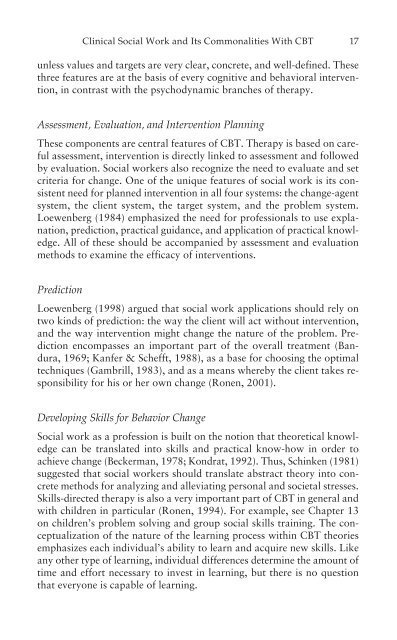Tammie Ronen, PhD - Springer Publishing
Tammie Ronen, PhD - Springer Publishing
Tammie Ronen, PhD - Springer Publishing
Create successful ePaper yourself
Turn your PDF publications into a flip-book with our unique Google optimized e-Paper software.
xxiv<br />
INTRODUCTION<br />
dynamic therapists. Through an extensive literature emerging over the<br />
last two decades, CBT has been applied to virtually every patient population,<br />
treatment context, and diagnostic category as Beck points out in<br />
his foreword. This revolution (and its literature) has circled the globe.<br />
There are associations for cognitive behavior therapy (CBT) in Europe,<br />
North America, South America, Asia, Australia, and Africa.<br />
Emerging first within the discipline of psychology, CBT has been<br />
nurtured and has grown over the years to become one of the primary<br />
models of treatment. Interestingly, even though some of the earliest and<br />
most important contributors were physicians (Wolpe and Beck), CBT has<br />
only recently taken hold in psychiatry. Goisman attributed the problems<br />
of CBT moving into psychiatry being due to the power and influence of<br />
the more senior and psychoanalytically oriented professors. Social work,<br />
one of the most important areas of health and mental health practice, has<br />
not been part of the CBT revolution. None of the founders and only a few<br />
of their students have come from social work.<br />
Contemporary psychotherapy treatment has moved away from clinical<br />
decision making based on “clinical experience” to a model that requires<br />
critical thinking and empirical support. While it is romantic and<br />
even a bit magical to present therapeutic successes in anecdotal form, it<br />
lacks the science that is being required by 21st century practice. The need<br />
for empirical support is driven not by the vicissitudes of managed care,<br />
but by informed clinical practice.<br />
In some ways, social work practice has moved away from its basic<br />
roots in practical and objective changes in individuals, families, groups,<br />
and systems. The need for evidence-based practice in social work is a clarion<br />
call. Thyer, Myers, Gambrill, and <strong>Ronen</strong> (this volume) all describe the<br />
need for social work to embrace an evidence-based stance. Clinical reports,<br />
personal observation, and client statements of satisfaction are not<br />
enough to support practice. The use of a particular intervention for many<br />
years gives it longevity and can even be designated as clinical experience,<br />
but does not necessarily make that intervention the best or most efficacious.<br />
The necessity of outcome assessment now being required by many<br />
agencies and institutions requires that clinical social workers must work<br />
to not only help clients feel better, but to get better in measurable ways.<br />
The goals of clinical social work must include helping individuals,<br />
families and groups to be happier, more personally fulfilled, and more<br />
productive. It is essential, however, that the strategies (goals) and interventions<br />
(techniques) used to reach these collaboratively set goals are<br />
measurable, reasonable, proximal, and realistic. It is far more important<br />
in the short term to get better than to feel better. It is, in fact, the quest<br />
for short-term gain that often will lead individuals into the avoidance seen<br />
in the anxiety spectrum disorders, substance misuse, or eating disorders.

















